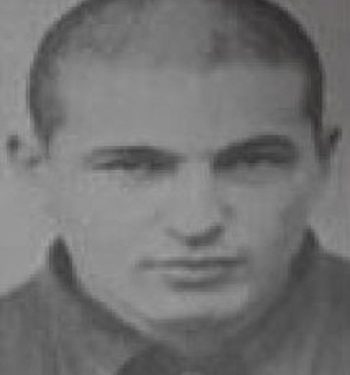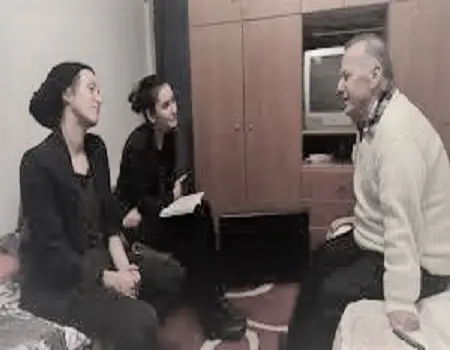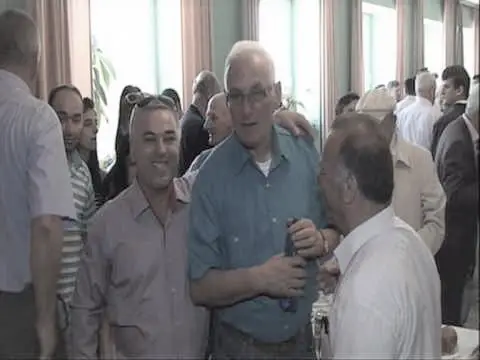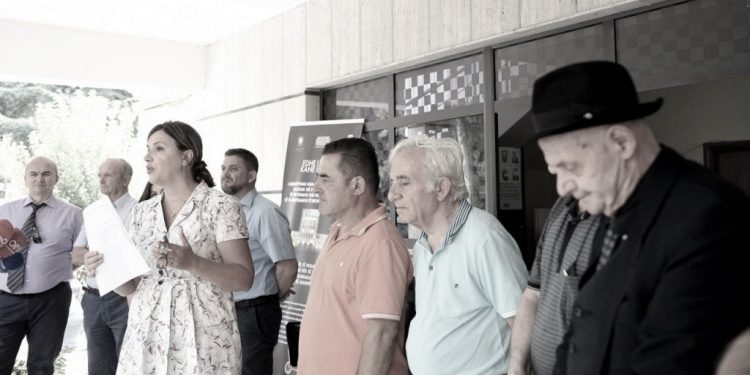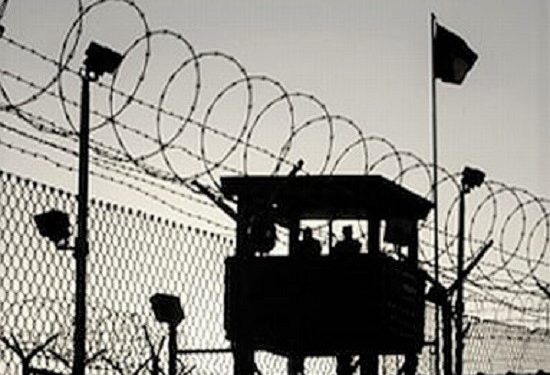From Briken Metaj
Rare evidence with the memories of the former political prisoner: “Elbasani prison, here the convicts, beg the guard to shoot them…”!
Memorie.al / Neim Pashaj, originally from the village of Dorëz in Tepelena, experienced the horrifying events up close and wrote them down in his diary on the spot. Many of the martyrs have had friends for years, and it was the last time they parted with them, as in the case of Reshat Agos from Berat and Mit’hat Alushi from Vlora, who sacrificed themselves one day in May in the prison camp where they had been serving their sentence for years. Saying goodbye to the guard’s knees has been a shock to him. “In Laç and Elbasan – says Pashai – every week we had dozens of such tragedies”. It was the time when political convicts were entrusted with the construction of the Superphosphate Plant and the Cement Factory. In addition to slave labor, they also faced violent repression in the camp. In Pashaj’s diary, the horrors of the prison camps of the 60s occupy whole pages. Shocking stories, unbelievable events, brutal violations of human rights are reflected there with simplicity and realism, as authentic evidence of the repressive regime we left behind…!
Excerpts from the diary of the former political prisoner, Neim Pashaj
SATURDAY
13 AUGUST 1966
They brought us from the Tirana prison to the Laçi camp. I have been sick for days in the prison infirmary. I found three more sick people here. I got to know them right away.
One is Halim Xhelua from the Duchy of Vlora, former general of the State Security in the period 1945-1965. He was convicted a year ago. The other is Ahmet Kolgjini, the son of Tahir Kolgjini, the former prefect of Kurveles at the time of the Kingdom.
Earlier he was interned. After 1960, they punished him. The third prisoner is Iljas Metko from Korça, a simple man with nationalist beliefs. He tried to escape; he was sentenced to 15 years.
As early as the day after arriving at the infirmary, I was visited by the camp commander, Azbi Lamçe, a slightly fat middle-aged man. He approached my bed and after asking about my health, he asked me why I had been punished.
-For a conversation about escape, I told him right then and there.
– Who did you talk to, who you will run away with, you devil stream – he added.
– I didn’t talk to anyone, my uncle ran away and they punished me.
– After going dummy for the boy. Okay okay, don’t be upset- and made to go away. Sakaq looked at the former general who had once been the capo of the Secret Police and pronounced:
– Hey, Halim, this is punished for 12 years. Yes, this is a child. Even these do not know what they are doing!
The ex-general was tight-lipped and didn’t try to answer him.
The commander turned to me again, and then gave someone the task of notifying the tailor and the cook. He was the first to measure me to cut me a pair of clothes because: “this one is so short, they don’t make the ones we have”, while cook Doda had to take care of the food.
When the general came out, he explained to me that during the Koçi Xoxes period, he had been convicted but was later acquitted. However, as much as I communicated with him, he seemed to me to be a fatherly man. At least that day…!
THURSDAY
SEPTEMBER 1, 1966
After the last visit, the doctor concluded that the disease had passed and I was able to work. Now not only did I feel good about my health, but I was also calmer because I was working together with my friends.
Contact with them was the reason to learn many interesting stories. The first ones I met were two boys from Vlora, Mustafa Iliazi and Namik Zeneli.
They were convicted of wanting to assassinate Khrushchev when he came to visit Pashaliman in May 1959. I don’t know how true this accusation is, but they are very communicative and affectionate with other convicts.
Now that relations with Moscow have been broken and, moreover, Khrushchev has been declared an enemy of communism, Mustafa and Namiku have written a letter to the Government, to reconsider their punishment.
This was a good omen, but luck was not with them.
The answer that came from Tirana finally erased all hope. The attempt to kill Khrushchev was indeed political – the Tirana officials said – but you had not made the plan to destroy an enemy of the Labor Party, but a great friend of ours and of Socialism as a whole.
That’s how Mustafa and Namiku gathered their minds and put off the days they had left. A young man often stayed with them, from Medari i Gjirokastra. His name was Sazan Hadëri and they said he was the grandson of Shefqet Peçi.
Sazani, you had a short but compact body. He was well prepared for fighting and all kinds of police arrests as he had completed the Police School in the Personal Security branch. He had worked for some time in his profession.
This had given him the opportunity to go abroad, where he had seen a different reality than what was being talked about here. As far as he had seen, he had spoken. As the grandson of the eldest, he had been called and ordered not to babble, but he in his.
Then he was arrested with a hostile group and sentenced to 25 years in prison. “There are no shackles for me”, Sazani said and said that he would break the prison and run away, he would weave plans, how to cross the barbed wire…!
TUESDAY
SEPTEMBER 5, 1966
It was the moment when we are returning from work in the prison camp. At the top of the stairs of the silo, with the name written at the entrance: ‘Sleeper’, someone came out and was reading the telegrams and letters that came in the mail. A great calm is thus established. In the middle, the name Neim Pashaj is heard.
– Here, here, I answered and went and took the letter addressed by Ylli, the brother behind me. I moved a little further, opened it quickly and began to read in one breath.
He explains to me that; they are all in good health and thank me. I read it and re-read it several times. Jonuzi, the oldest of the camp, who had noticed me, approached me and asked me who had sent me the letter.
– From home, brother – I answered.
-How are they, what do you mean?
-Good very good.
– Thank you that they are safe and sound – and extended my hands to do the usual laps. Meanwhile, we started talking about the people we had outside the wires.
Jonuzi knew my father and spoke to me at length about him. At dinner I felt relieved, but I missed my relatives, especially my father and three brothers.
I thought that from now on, I would get the letters of the miss, but when I learned that only two of these were allowed each month, I was very upset. They were posted on fixed dates of the 15th and 30th and distributed among us whenever they arrived at the camp…!
TUESDAY
DECEMBER 6, 1966
What I saw with my eyes today was terrible. My three friends, Sazan Haderi from Gjirokastra, Murat Marta, from Bërzeshta e Librazhdi and Naum Kondakçiu, from Lushnja, broke the prison gates.
Yes, their adventure reached here. Everything happened when the “ZIS” type car entered the camp, supplying the kitchen.
They kidnapped him and tore open the prison gate with him. When they got on the road, they almost collided with a passenger bus. To avoid this, “ZIS” stopped. The bus also stopped.
For a moment both vehicles were side by side. The camp’s perimeter guards started shooting with machine guns.
The three convicts jumped out of the car and ran away towards the forest, behind the Automotive Park of Laçi. Meanwhile, an officer got out of the bus, took out his pistol and fired seven times from where the trio fled, leaving the prison.
We were all out and watching the event closely. Our hearts wanted them to be saved. The Christmases continued without fail, for several hours.
An alarm had been given in the camp. We lined up in the center of it. The officer of the watch began the name-by-name appeal. The three of them, Murat Marta, Naum Kondakçiu and Sazan Hadëri, were missing.
“Alive or dead, you’ll have them here within 24 hours,” the guard officer vented and went out. Then someone ordered and we were locked inside the silo. At his door, two policemen were standing, machine gun in hand.
Whoever needed services was accompanied by one of them to the bathroom. The other stood tensely at the gate. The camp was put on alert number one. We spent hours in this state.
At midnight, there was a noise in the shed. I woke up and was looking at what was happening. Two officers and a group of policemen were dragging Sazan and Murat.
Their hands were tied with barbed wire. Blood flowed from his fingers. They were soaked to the core. They had beaten and tortured them so hard, that they were completely disfigured and hardly recognizable. As soon as I saw them, my mind went to Naumi. Ishallah – I thought – he escaped without falling into the hands of the Jahilis.
Around five o’clock in the morning there was a wake-up call. They ordered us all out. They had thrown Naum’s body to the cement strip where the food containers came to us. I rushed to see him.
My flesh shuddered and I was shaking all over. His face had turned yellow. His clothes were made scarlet. The many bullets he had taken had disemboweled him. I approached.
One moment, I gathered them and put them in my stomach. With a cloth I found nearby, I covered his face. I couldn’t take it anymore and got up. My legs felt numb. I ran away and lay on the bed. It didn’t take long, and I was called to the guard officer.
A civilian who was there demanded a threatening account of me because I had covered the murdered man and I had a relationship with him. I immediately explained something to him without thinking for a long time.
– What about you don’t have a mind like that – he asked me and after kicking me in the stomach, he ordered the policeman to take me to my friends…!
WEDNESDAY
JANUARY 4, 1967
We don’t work for a few days. We only go around and play inside the prison camp of Laçi. Yes, the peace and comfort was broken for a moment. Around eight-thirty in the evening, when we were waiting for a forced break, the voice of the guard officer was heard on the internal loudspeaker: “Pay attention, pay attention.” With frozen hearts we waited for every word.
So he began to communicate. All who will hear the name prepare their loot and prepare to move. It started with first names. About halfway through, I heard my name.
I was shocked. Everyone was stunned. When the list went to the 300th, the guard officer explained that the next day we would be traveling to the Elbasan prison camp. That night no one got any sleep…!
WEDNESDAY
MARCH 31, 1967
My friend, Iliaz Metko, was released from prison today. I led him to the outer gate. He was a smart guy, although he didn’t have much schooling. Rather, he had life experience.
Iliaz was from Dersnik of Korça. He came from a nationalist family. His grandson, Sade Voskopi, had been the commander of the “National Front” detachment of the province.
The father-in-law in Porodina, yes, an early nationalist. The reason for Iliaz’s arrest was a “Berret” pistol, which he had kept since the war.
One winter day, he had gone to the mountains with another villager to make firewood. For a moment, the animals they had with them were endangered by the wolf.
Iliazi had taken out the “Berret” and had fired in his direction. The Christmases terrified the wild and saved the animals. They were saved, but poor Laze, quite unintentionally, entered the circles of danger. Vigilant colleague, you did not forget to report the illegal weapon. That was enough and Iliaz Metko was arrested. The punishment was not long in coming. Accusations: Attempt to escape and possession of weapons without a permit. In prison, he benefited from the 1959 pardon and the 1962 amnesty.
Another part was forgiven for work and good behavior. After eight years, he was released. He spent eight years away from his wife and four daughters: Ismet, Ferzie, Ganimete and little Mukadez. Leaving the camp gate, he promised me that he would write to me constantly and would also go to my house in Doreza…!
FRIDAY
MAY 15, 1967
By the time I was about to celebrate the first anniversary of the arrest, two shocking events took place in the camp. Two of our friends died in terrible conditions. One was the wise and generous old man from Berat, Reshat Ago. The other, the boy with an angelic face, from the Duchy of Vlora, Mit’hat Alushi. What happened to them?
The 70-year-old man, Reshat Ago, had a special passion for pigeons. He spent a large part of his free time with them. For his old age, he was engaged in light work.
However, he often expressed sadness and occasionally burst into tears. One day suddenly, he decided to leave this world, going towards the soldier guarding the outside of the prison camp.
He went in front of the first guard. Then to the other two. Among the latter, there was a large field. He took a wooden ladder and started climbing it, and jumped from there.
Crossed the restricted area. The guard warned him bluntly, “Stop, stop because I’m going to shoot.” Yes, the old man had collected his mind and did not want to know.
The threatening voices did not enter his ears. The soldier shot into the air. Apparently, a human heart was beating in his chest and he did not want to become a gravedigger of a man, even if he was an “enemy of the people”, as the commissar taught him in political class. Reshat Ago, stayed for a moment, carefully looked around as if to measure the distance from freedom.
He had decided to touch it at any cost, as a child does when it is taken to its feet for the first time, and loses its balance and falls.
He took his steps. The guard started with a flurry. Now his words, “Stop, Stop”, were drowned out in the sound of crackling. Elder Reshat took a deep breath. The Promised Land was just two steps away. He started to move but the machine gun fire stopped him in place.
He gave the body money. At least it gave you the spirit outside the wires. He fell to his knees, stood up again and turned his head to see for the last time the hell he had spent many years in.
It swayed and rolled and fell like an oak tree, never to rise again. The white-hearted old man fell, half here and half there.
A few days later, the boy from Vlora, Mit’hat Alushi, died there. In such conditions, he too. It was morning. I was talking in the appeal square, with an old man from Lazarat, when he approached us.
He gave us his hand and started a song: “The brave who is brave / He will never know / Stay calm and don’t move / and everything dissolves in his breast…”!
After a while he left for the taps. Not even two minutes passed when we heard a loud “Stop” from the guards of the silos. Then a warning voice; “Stop, I’m going to shoot.” So the two guards’ machine guns crossed fire.
Mit’hati had passed the first siege and had arrived at the second. The soldier in the village spoke on his behalf: “Mit’hat, stop because we will kill you”.
But the 22-year-old boy, you had decided once and for all. Not even the benevolent call on behalf of the soldier with whom he seemed to be known had any effect. Mit’hati also passed the second siege.
He walked in the field planted with potatoes and looked back from time to time. On the opposite hill, there was a bodyguard with heavy weapons. It was a dominating point, for the camp and the factory.
The soldier who happened to be there, shot heartlessly. When Mit’hati got 30 meters away from the camp’s outer perimeter, he opened fire with a machine gun in his direction. Dozens and dozens of bullets covered the boy’s body and blood covered the body.
Mit’hati fell in the middle of the green field. He was not used to living in a cage and did his best to tear it apart. That’s how Mit’hati i Dukat stayed in Baltëz, at the tenderest age, at the age of dreams…”! Memorie.al




